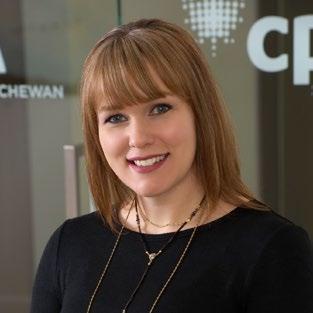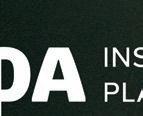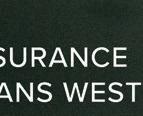

Focus on Firms
THE 5TH ANNIVERSARY EDITION
In this issue, we’re celebrating five years of publishing firm-specific, firm-focused content! This is a big milestone for our staff in providing content to support over 1,300 CPAs working at firms in Saskatchewan.
We know that working in a firm and managing compliance with regulations, professional standards and client expectations is hard. Additionally, not every firm looks the same – gone are the days when the structures and services offered were largely similar. In reflecting on the 60+ articles, blurbs, content pieces and promotions offered since 2018, we have compiled the top 5 articles that garnered the most attention (plus one honourable mention!)
Firms continue to innovate, adapt, and specialize in so many unique ways to deliver value to their clients. With this in mind, we have also compiled articles relating to some of the key issues being faced by firms in the immediate future.
With all that, the advice I received from my practice inspection predecessor many years ago is as true today as ever – document your work, don’t take on work that is too complex for your skill set, don’t cut your work if you cut your fees, and always stay up to date with professional development.
Leigha Hubick, CPA, CA
Content and Editing
Nicholas Carteri
Marilyn Flaman, CPA, CA

Pam Hoffart
Leigha Hubick, CPA, CA
Vivian Nicholas, CPA, CA
Sherri Schmidt
Jennifer Zerr, CPA, CA
Production
Pam Hoffart Chess Club Agency
Disclaimer
The content within this newsletter is provided for informational purposes and is not an official interpretation of any applicable rules or standards.
We live and work on lands covered by Treaties 2, 4, 5, 6, 8, and 10. These are the territories of the Anihšināpēk/ Saulteaux, Dakota, Dene, Lakota, Nakoda, nêhiyaw/Plains Cree, néhinaw/Swampy Cree, nehithaw/Woodland Cree, and Stoney Nations. They are also the homeland of the Métis/Michif Nation. We pay our respects to the First Nations and Métis ancestors of this place and reaffirm our relationship with one another. We respect and honour the Treaties that were made on all territories, we acknowledge the harms and mistakes of the past, and we are committed to moving forward in partnership with Indigenous Nations in the spirit of reconciliation and collaboration.
The top 5 referenced articles from the past 5 years

CYBERSECURITY RISKS ALL FIRMS SHOULD BE AWARE OF

As businesses, employees, and clients adapt to remote work structures, CPAs must practice the profession within the context of the standards of professional conduct to protect their organizations and clients. COVID-19 and remote work arrangements have presented cybersecurity challenges that must be overcome. Emerging threats are significant, and the risks are growing.
There are three types of cybersecurity breaches to be aware of: 1. Confidentiality 2. Integrity 3. Accessibility
collected, used, or disclosed by private-sector organizations. As a result of COVID-19, firms may be collecting additional information about employees’ health, exposure, interactions with other individuals, or travel history. Health information is particularly sensitive and is subject to PIPEDA.
Protect Your Firm
Protective safeguards and best practices, such as the following, should be put in place:
• Using data encryption and password protection when storing and transmitting confidential documents.
• Tightly controlling access with multifactor authentication.
• Logging out of computers when they are not in use.
• Disabling or unplugging smart listening devices (such as Amazon Alexa and Google Home) during work hours.
• Limiting the collection of personal or confidential information to only what is necessary.
Integrity
Confidentiality
Breaches of confidentiality involve the unauthorized access and disclosure of information. These breaches can be particularly damaging for CPAs and firms as the loss or theft of confidential client information could harm the client, lead to loss of trust, and erode the client-practitioner relationship.
The right to privacy is a closely related concept. Care must be taken to ensure the privacy of clients’ and employees’ personal information. In Saskatchewan, the Personal Information Protection and Electronic Documents Act (Canada) (PIPEDA) applies to personal information
Integrity breaches can result in corrupted data and the manipulation of information for malicious purposes. These attacks are often difficult to detect and may result in inaccurate information that leads to a loss of trust in your firm. Issues with data integrity may also adversely affect your ability to comply with the Rules of Professional Conduct by eroding competence or associating with false or misleading information.
Firms with fewer effective security safeguards in place are more vulnerable to cyber-breaches and are less likely to detect breaches that compromise the integrity of information they hold.
CYBERSECURITY RISKS
Protect Your Firm
continued from page 3
Protective safeguards and best practices, such as the following, should be put in place:
• Periodically inspecting user privileges and reducing them if unneeded.
• Reviewing user accounts for signs of suspicious activity.
• Scheduling regular password changes.
• Backing up data and systems off-site.
Availability
Attacks on availability can prevent authorized users from accessing information or systems when needed. This could result in financial losses for firms due to the inability to access the resources required to perform work as well as the costs associated with regaining access.
Protect Your Firm
Protective safeguards and best practices, such as the following, should be put in place:
• Ensuring adequate network security.
• Updating systems and software regularly.
• Backing up data and systems off-site.
For More Information
To learn more about intrusion prevention and response, incident reporting, end-to-end encryption, and business continuity, firms should seek expert guidance and adopt a culture of continuous improvement towards cybersecurity.
For more information on privacy laws in Canada, click here
Click here for more cybersecurity resources. CPA Canada has a website dedicated to helping you address the challenges arising from COVID-19. Find updated information and resources here

REMINDER!
Renewal of your firm registration for the period January 1, 2023 to December 31, 2023 (2023 permit/licence) is required by Regulatory Bylaw 10.4.
You are required to complete the renewal form and pay the renewal fees online through the Firm Portal by December 31, 2022. To assist with your renewal, we have published a guide.

The process has changed – for more information and resources, visit our website
NEW RULES FOR TRUST REPORTING ARE COMING FOR 2023 RETURNS
Learn more about the expanded reporting requirements for trusts set out in the August 9, 2022 draft legislation.
New rules for trust reporting are coming for 2023 returns (cpacanada.ca)
USING YOUR FIRM LETTERHEAD:
NOT AS INCONSEQUENTIAL AS IT SEEMS
Authored by Quebec CPA OrderAs a client service, you print and collate the engagement report and the final financial statements. Printing the engagement report such as a Compilation Engagement Report, Review Engagement Report, or Independent Auditor’s Report on your letterhead is acceptable and common practice. However, using your letterhead for individual pages of the financial statements might not be good risk management practice. Here are five reasons why:
1. In a compilation engagement, you are simply compiling the financial statements from information provided by your client and having the financial statements on your letterhead may suggest a higher level of involvement than is appropriate;
2. No matter the type of engagement, the financial statements are management’s responsibility;
CANADIAN TAX NEWS
As we come close to the end of the year, catch up on key tax highlights and updates you may have missed.
Canadian tax news (cpacanada.ca)
3. You go to great lengths to make sure your clients take responsibility for their financial statements by having them sign an engagement letter, a management representation letter and approve journal entries;
4. Management is required to approve and take responsibility for the financial statements prior to you finalizing the report;
5. It is logical to put the report or communication attached to the financial statements on your letterhead since it is your signature at the bottom of the page.
For all these reasons, printing all pages of the financial statements on your letterhead sends the wrong message to your client and third parties using those financial statements.
PRACTITIONER’S PORTAL
Find resources to advance your career, learn about the latest technical changes and enhance your skillset with useful tools such as:

• The Professional Engagement Guide (PEG)
• Audit Quality and Tax Blogs

• Podcasts
• Webinars and e-learning
Find all of this and much more at practitioners.cpacanada.ca.
PRACTICING IN ASSOCIATION WITH NON-MEMBERS
CAN A CPA WORK FOR A NONMEMBER AND SIGN REPORTS (ASSURANCE OR COMPILATION)?
The common answer is no.
CPA Saskatchewan only has jurisdiction to register, licence, investigate and discipline registrants in Saskatchewan. CPA Saskatchewan does not regulate the practice of nonregistrants. CPA Saskatchewan may issue a cease and desist to a non-member signing a report that links to the CPA Canada Handbook.
CPA Saskatchewan Rules do not contemplate a CPA engaging in the practice of professional accounting or other regulated services as an employee or contractor when engagements are being issued by a non-registrant. Meaning, the regulation of the profession requires that members who provide services to or for the benefit of a client must register a firm. Firms may be sole proprietors, partnerships, another type of entity or professional corporations. Therefore, a CPA working or contracted as an employee of a non-registrant firm would be required to register a firm, obtain PLI and be subject to inspection. Rare exceptions occur, contact registrar@cpask.ca for more information or to set up a call.
This means that a CPA cannot carry on the practice of professional accounting through an entity owned or coowned by a non-member. You can only provide professional accounting or other regulated services through a firm fully owned by CPAs, that is licensed and registered with CPA Saskatchewan.
BUT WHY?
The government has delegated to the Institute self-regulatory status, with those objects as fundamental requirements for CPA Saskatchewan, as follows:
(2) The objects of the Institute are: (a) to regulate the practice of the profession and to govern the registrants in accordance with this Act and the bylaws; and (b) to assure the public of the knowledge, skill, proficiency and competency of registrants in the practice of professional accounting and other services provided by registrants.
To fulfill the objective of the legislation, CPA Saskatchewan must be in a position to assure the public of the work performed by registrants, and to do that we need jurisdiction over their conduct.
UNDERSTANDING THE RULES
When a CPA works with a non-member in the practice of professional accounting or other regulated services, you are directly responsible for their compliance (or failure to comply) with the CPA Code, which is deemed to apply as if the non-member were a member. This also applies when a non-member owns an interest in or works for a “related business or practice”.
AcSB EXPOSURE DRAFT – IMPROVEMENTS TO ACCOUNTING FOR COMMON CONTROL COMBINATIONS
The AcSB wants your feedback on its proposed amendments to Related Party Transactions, Section 3840. The proposed amendments address accounting for a combination between enterprises or businesses under
common control and financial assets acquired or financial liabilities assumed in a combination between enterprises under common control. Submit your comments by January 31, 2023.
August 2019
WHAT TO EXPECT
FROM PREDECESSOR AND SUCCESSOR ACCOUNTANTS
CPA Saskatchewan receives many questions regarding what information to share with the successor accountant and what can be asked for from the predecessor accountant.
The Rules of Professional Conduct 225 and 226 series set out the cooperation requirements between the predecessor and successor accountant.
WHAT IS THE SUCCESSOR ACCOUNTANT REQUIRED TO DO?
Per Rule 225.1, the successor accountant shall not accept an engagement without first communicating with the previous person or firm and enquiring whether there are any circumstances that should be considered that may influence the decision whether to accept the engagement.
The predecessor accountant is required to promptly respond (i.e. within 30 days) to the communication and must advise the successor whether suspected fraud or illegal activity was a factor in their resignation from the engagement or, in their view, a factor in the client’s decision to appoint a successor.
The successor accountant must do a reasonable job to follow up to receive the correspondence prior to accepting the engagement.
WHAT IS THE PREDECESSOR ACCOUNTANT REQUIRED TO DO?
Per Rule 226.1, the predecessor, upon written request of the client, and on a timely basis (i.e. within 30 days), shall supply reasonable and necessary client information to the successor.
Further, the predecessor is required to cooperate promptly to the client, or on the client’s instructions, to the successor. The predecessor shall provide all property of the client’s in their possession in the medium that will facilitate a timely and efficient transfer. Electronic documents may be provided electronically rather than in paper format, as this best serves the client’s interest.
As the rule indicates that the property of the client shall be transferred, any working papers developed by the firm as part of their procedures to complete the engagement are not required to be transferred. However, the firm may choose to do so. Copies of the trial balance, ledgers, continuity schedules that facilitate the transfer of the information to serve the client’s best interest are to be shared.
If the client has not paid their fees, and this resulted in the firm resigning from the engagement, this information can be shared with the successor.
For any questions on communication between the predecessor and successor accountant, please email monitoring@cpask.ca.
REVISED CAS 315 RESOURCES
CAS 315 has been significantly revised to promote a more effective risk identification and assessment. Learn about the changes to the standard and understand how these will impact your audit engagements.
Revised CAS 315 resources | CPA Canada

WHY A SYSTEM OF
QUALITY MATTERS
A system of quality is important for all firms providing various professional services – from a sole practitioner with no staff to a large, multi-national firm. There are three key stakeholders involved when providing services: the client, the public and you as the firm (CPA or group of CPAs). The stakeholder that often receives the least attention is the public – mostly because the public tends to not raise concerns until an event occurs and they lose money unexpectedly. When this happens, they will likely sue the firm for the financial loss and file a complaint with CPA SK. In many cases, these events are caused by a lack of or a poor system of quality.
In addition to the financial losses and complaints indicated above, other unintended consequences may result from a poor system of quality or lack of quality management:
• Negative practice inspection findings or re-inspections
• Loss of professional reputation
• Loss of clients and fees
• Extra costs
• Time spent correcting performance problems and fixing mistakes
• Time spent defending and settling lawsuits
• Professional misconduct charges
HOW CAN YOU AVOID THIS
The success or failure of a firm depends on an appropriate and effective system of quality to guide the firm in providing quality services that meet the needs of clients.
Developing a system of quality takes some time and effort, but those efforts pay off. In addition to meeting the public’s needs, good quality management procedures also impact other aspects of a professional practice. An appropriate and effective system of quality will lead to:
1. Satisfied clients, which could lead to increased fees through additional services and referrals to friends and business associates to the firm.
2. Doing well in your practice inspection and, if files are properly organized, saving on time, which results in lesser costs to the firm.
3. Completion of work more efficiently, at a reduced cost, which results in improved profitability of operations.
4. Enhanced professional reputation within the profession and in the business community.
WHAT ARE SOME WAYS THE FIRM CAN IMPLEMENT OR IMPROVE ITS SYSTEM OF QUALITY?
There are many resources available to firms to help in this area. An appropriate and effective system of quality is very dependent on the unique circumstances of the firm. However, one resource available to all members for FREE is the Practitioner’s Toolkit available on knotia.ca.
QUALITY WORK REQUIRES CONTINUOUS EFFORT
While the firm operates to meet the needs of your clients, it is also in practice to make money. So, although there are costs associated with establishing a system of quality and maintaining those quality management standards, those costs should be more than offset by the benefits of increased fees and reduced costs, which increase profitability.
As the practice grows, you need to continually evaluate and improve your firm’s internal control environment. Each year, the firm will be accumulating confidential client records that need to be safely stored. Hiring staff as the firm expands also exposes you to more risks, such as theft or staff error. In addition, the firm will likely acquire more computer equipment and office supplies. Therefore, you need to think about how you will safeguard your assets to protect your business. In addition to these risks, as your business becomes more complex, so too will your own financial management and reporting requirements. You need to consider how you will ensure that the firm’s financial information is accurate and reliable.
As a CPA, you are familiar with the concepts of an internal control environment. However, when a practice is growing quickly or experiencing cash flow issues, the importance of a strong internal control environment can be overlooked. The following are some of the principal internal controls that you should consider implementing in your firm1:
WHY A SYSTEM OF QUALITY MATTERS
1. Physical controls
Physical controls primarily serve to safeguard firm assets. These controls include such things as locking your offices; restricting access to certain sensitive areas (e.g., your server room or file room); installing security systems and cameras; and using secure cabinets and safes.
2. Information technology (IT) controls
IT controls serve to protect your hardware, software and data. These controls include the use of computer passwords, restricted access to certain data, authorization requirements for accessing or changing data, regular data backups, firewalls, and antivirus software.
3. Financial information controls
Financial information controls protect the integrity and accuracy of your firm’s financial data. These controls include the sequential numbering of cheques; bank and accounts receivable reconciliations; automated controls, such as valid date ranges or dollar value limits; segregation of duties; independent review of postings; validation checks and exception reports; authorization of payments; and approved authority levels. Setting budgets and performing budget to actual comparisons are additional key financial controls that can be implemented.
4. Risk management
The concept of risk is not new to practitioners. It has been around as long as the profession has provided services in a commercial setting. However, the issue of risk and risk management has increased in importance as the number and size of legal claims has increased over the years.
Even if you can’t completely eliminate most of the risks associated with being a practitioner, you can implement ways to reduce and manage them to an acceptable level.
Risk management has a specific impact on life in an accounting firm. It is important in terms of protecting the assets, finances and operations of the firm and contributing to satisfactory legal compliance, corporate governance and due diligence. Consequently, risk management will protect the reputation, credibility and status of the firm.
Establish a risk management “culture” in the firm that emphasizes the importance of managing risk as part of each staff member’s daily activities. The goal of creating a risk management culture is to create a situation where partners and staff instinctively look for risks and consider their impacts when making effective operational decisions.
continued from page 8
The essence of a risk management culture is that it is not geographically dependent, or specific to any location. The principles in establishing this culture are universal and relevant to each locality.
5. Other processes
File review and report issuing processes, business continuity planning and the key elements of prevention, preparedness, response and recovery are also important when managing risk in the day-to-day operations of the firm. This also includes strategies to deal with the death or incapacity of the practitioner.
Obtaining and reviewing insurance is another way to manage risk within the firm.
SOME OTHER GENERAL TIPS: Don’t get behind on PD
CPA SK and CPA Canada offer courses on all the latest and greatest standards. Know your clients and take the right courses to ensure you:
• Understand the standards
• Know how to apply them
• Document your files appropriately with that understanding
Don’t use out of date materials
The CPA Canada Handbook changes daily it seems, but that is no excuse for using outdated material to complete a file.
Don’t cut work when you cut your fees
Regardless of the fees charged:
• Work needs to be sufficiently and appropriately documented
• Staff work needs to be reviewed
• Lack of staff is not a valid cause for poor file conditions
Don’t
take on work that is too complex for your skill set
Our field is increasingly specialized – do not accept or continue with engagements from clients that could increase risk to your firm because the business is too complex.
• Know and accept your limitations.
• Use a specialist if required.
1 IFAC SMP Guide (https://www.ifac.org/publications-resources/guide-practice-management-small-and-medium-sized-practices)
CPA Canada Practitioner’s Toolkit (www.knotia.ca)
ALWAYS READ THE FINE PRINT IN YOUR INSURANCE POLICY
Written by Garry Hannaford, FCPA, FCA, in 2010. Originally published in ICAS Horizons in 2012. Updated for unification in 2015.
Have you ever signed a contract only to find out months later that you didn’t get everything that you thought you were getting? This can be the case when you are purchasing professional liability insurance (PLI) for your practice.
In order to protect the public, CPA SK requires that all firms carry PLI with the following minimum coverage:
• $1,000,000, where one (1) member is engaged or employed in one or both of professional accounting, compilation engagements or taxation services;
• $1,500,000, where two (2) or three (3) members are engaged or employed in one or both of professional accounting, compilation engagements or taxation services in the same firm; or
• $2,000,000, where four (4) or more members are engaged or employed in one or both of professional accounting, compilation engagements or taxation services in the same firm.
For firms not engaged in the practice of professional accounting, including compilations, or taxation services, the minimum requirement for professional liability insurance is $250,000 per practice leader.
In the event that a member or firm is found to be at fault, PLI provides funding to pay awards to the party who experience financial loss (i.e. injured party).
It is important that members and firms carefully review all of the provisions on the insurance contract to be certain that it provides you with the coverage you require. The inconsistencies among policies that we have noticed include:
1. If the limit of the liability includes defense costs it could mean that a good portion, if not all, of the insurance could be used to pay the defense costs of the claim rather than being used to pay an award to the injured party. This is not consistent with the minimum PLI requirements and would leave you exposed for any shortfall.
Honourable Mention August 2018
2. An insurance provider may decide to exclude certain high-risk clients, such as public companies, from coverage by your insurance policy. Please ensure that there are no such exclusions in your policy.
3. Some insurance providers restrict coverage for services performed prior to the inception of a policy. While this may seem reasonable on the surface, policies for PLI are written on a claims-made basis. This means that a lawsuit made today could relate to services provided six years ago, or in some cases longer. If your policy does not provide coverage for your prior acts, there will be no coverage for the claim even though you had a policy in place at the time the services were rendered. Therefore, your policy must provide full prior acts coverage.
4. Since policies are written on a claims-made basis, CPA SK requires that insurance be carried for a minimum of six years after a member dies or ceases to practice. If you are a partner in a firm, the firm usually continues to carry insurance for retired partners and former partnership throughout this six-year period. However, if a sole practitioner retires, he/she must continue to carry PLI for the six-year discovery period. Please ensure that your policy provides coverage for this entire period.
5. Many insurance providers indicate that they provide worldwide coverage; however, upon more careful review of your policy you may find that coverage is only available if the suit is brought within North America and Bermuda. Generally, if the Canadian CPA is doing work outside Canada, which is happening more frequently as CPAs work in the global marketplace, any ensuing lawsuit would be brought within the country where the services were performed.
It is your responsibility to ensure that your policy provides the coverage required for you to meet the CPA SK’s mandatory insurance by-laws that have been put in place to protect the public.
Always read the fine print in your insurance contract to avoid being surprised if you ever face the unfortunate situation of having to make a claim under your policy.
Looking Toward the Future

SUSTAINABILITY STANDARDS
SUSTAINABILITY RESOURCES
An increasing number of entities are providing information on their sustainability or environmental, social and governance (ESG) performance. A variety of factors, including growing investor and stakeholder demand and new regulatory requirements, drive this.
Assurance is an important component of this evolving reporting landscape, and we expect demand for third-party sustainability assurance services to increase in the future. Assurance providers may also be called upon to evaluate an entity’s sustainability reporting controls and processes, as well as provide advice on sustainability-related reporting and compliance obligations.
To help you navigate this rapidly changing landscape, CPA Canada has compiled an inventory of information resources related to sustainability assurance and reporting. New content will be added regularly.
Sustainability assurance resources | CPA Canada
MOST CANADIAN COMPANIES ARE IGNORING THE TRUE COSTS OF DOING BUSINESS
New report from Queen’s Institute for Sustainable Finance finds that beyond the largest public corporations meaningful climate-related risk reporting barely exists.
By Sean Cleary And Pamela Steer | November 17, 2022 Republished with the permission of Corporate Knights, view the original article.
Last Wednesday was finance day at COP27, a chance to discuss how financial institutions can do their part to tackle the climate crisis. Last year, this day generated big headlines as Mark Carney’s Glasgow Financial Alliance for Net Zero announced it had brought together 450 financial firms pledging to decarbonize economies.
There has been less fanfare around finance at the UN Climate Change Conference this time around, but it is very important to keep the global momentum from Glasgow. Are we making progress in Canada? While there is a lot of goodwill in the financial industry, and a significant amount of capital flowing to address the climate crisis, we are being held back for a variety of reasons.
IRCSS CONSULTATION PAPER
A global study by the International Federation of Accountants (IFAC), the American Institute of Certified Public Accountants (AICPA) and the Chartered Institute of Management Accountants (CIMA), The State of Play in Sustainability Assurance, found that in 51 per cent of companies that reported sustainability information, some assurance was provided. Eight Audit firms conducted 63 per cent of those assurance engagements and 88 per cent of the engagements were conducted under International Standard on Assurance Engagements (ISAE) 3000 (Revised), Assurance Engagements Other than Audits or Reviews of Historical Financial Information.
Consultation Paper – Independent Review Committee on Standard Setting in Canada (ircsscanada.ca)
For a start, we need to do a much better job of assessing and disclosing the risks Canadian companies face due to climate change – both the costly devastation brought on by climate-related events, such as floods and fires, and the economic challenges of transitioning to a net-zero world. This is essential for Canadian competitiveness and the proper functioning of Canadian markets. It is also necessary for companies to develop their own plans to reduce emissions and adapt to a changing climate. Canadian and global bodies are currently drafting regulations for this kind of reporting, and this issue will eventually affect every Canadian company.
Financial institutions, including Canada’s largest pension funds, have indeed taken a leadership role, issuing rare joint statements in 2020 and 2021 that advocated for companies to provide climate-related disclosures to the highest global standards.
“We need to do a much better job of assessing and disclosing the risks Canadian companies face due to climate change.”
Organizations such as Chartered Professional Accountants of Canada have been vocal supporters of international standards for disclosures and helped lay the groundwork for the Montreal location of an office of the International Sustainability Standards Board (ISSB) earlier this year. Also, we are seeing that more Canadian companies are recognizing the importance of climate-related disclosures, and doing some really heavy lifting on preparing reports.
However, as a new analysis by the Institute for Sustainable Finance (ISF) shows, we have a long way to go in terms of providing the reliable, consistent, comparable and accessible climate-related data that is essential to make real progress.
The ISF report found that less than half of the largest TSX-listed corporations provided meaningful climaterelated risk reports during 2020, and beyond the largest public corporations, such reporting barely exists at all. There is also a need to improve the quality of climaterelated reporting, which is mediocre on average among the companies that do provide such information and varies significantly.
More broadly, as previous ISF research has demonstrated, a majority of Canada’s publicly listed companies are reporting on their greenhouse gas emissions, but progress seems to have stalled. And while more companies are setting targets for reducing their carbon footprints, we are lagging behind other jurisdictions.
What can be done when it comes to climate-related disclosures?
There is a key role for regulators to play, and climate-related reporting should be made mandatory, as we currently do with financial disclosures. The Canadian Securities Administrators issued proposed regulations for climate-related disclosures around this time last year, but there were some noticeable gaps, as the ISF identified at the time.
And we have since seen more stringent standards proposed globally by the ISSB, as well as the Securities and Exchange Commission in the U.S. We need to ensure that reporting in Canada is in line with global standards, so as not to disadvantage both our capital providers and the companies themselves that require capital at attractive market prices to prosper and remain competitive.
Mandating high-quality reports will mean more and better climate-related data, as well as improved access to data that already exists. We know that there is a hunger in the market among practitioners and sustainability experts for better data. Both public and private providers of corporate sustainability data should take note.
There is also a significant need to improve both education and leadership that illustrates the importance of such disclosures to both users and preparers of this information, with an increased emphasis on best practices.
We can mitigate climate change and adapt to the effects of a warming world. And business and finance in Canada have a major role to play in getting there. But we are still too often flying blind on the risks and opportunities of a changing climate and a transformed economy. That needs to change.

TECHNOLOGY AND DATA
TECHNOLOGY IS A DOUBLEEDGED SWORD: OPPORTUNITIES AND CHALLENGES FOR THE ACCOUNTANCY PROFESSION
Professional accountants play a key role in helping organizations navigate technological changes in an ethical manner. To do so, they must understand how to respect technology’s double-edged sword—actively pursuing opportunities while safeguarding against challenges.
The inevitable is upon us—change. In particular, the information technology revolution, which is a key driver of complexity faced by CPAs. CPAs must learn to navigate through the opportunities and challenges brought forth by this revolution while paying close attention to the world’s new golden commodity, data.
Data is the lifeblood of data analytics systems that offer insights and information impacting every part of society. Advanced data analytics and AI now make it possible to understand and influence consumer behaviour like never before, making the need for ethical leadership very important.
As CPAs grow to balance the double-edged sword that is technology, a crucial uptake will be that many of their current skills and knowledge in managing financial systems and controls and setting standards and auditing can be upskilled to accommodate a progressively digitized world.
Visit this link to download and read this publication to learn how CPAs can leverage digital transformation by employing a broader skillset that will help them flourish in their organizations.
Technology is a double-edged sword | CPA Canada
GENERAL INFORMATION TECHNOLOGY CONTROLS: IT RISKS AUDITORS MUST BE AWARE OF
Andrea Lee | September 2, 2022
Republished with permission from CPA Canada
Organizations increasingly rely on IT for internal operations and when engaging with external service providers. Keep reading to learn about auditors’ responsibilities related to their client’s IT environment and the related general information technology controls.
The world is increasingly digitized and connected. Organizational reliance on information technology (IT) applications, infrastructure, processes, and personnel is increasing for organizations of all sizes and complexity. With many auditors beginning to apply the requirements of revised Canadian Auditing Standard (CAS) 315, it is timely to share a few reminders of the heightened emphasis on general information technology controls (GITCs) in the revised standard and your related responsibilities as an auditor.
Revised CAS 315, Identifying and Assessing the Risks of Material Misstatement, includes enhanced material related to the auditor’s consideration of IT and the impact of this on the audit. The revised standard has also clarified the auditor’s responsibilities related to GITCs. The main changes related to IT are included in the auditor’s required understanding of the information system and communication and control activities components.
The Information System and Communication
As the auditor, you are required to understand the entity’s information system relevant to the preparation of the financial statements, including the IT environment relevant to how transactions and the processing of information flows through the entity’s information system and the entity’s financial reporting process. Understanding the relevance of the client’s information system to the significant classes of transaction, account balances, and disclosures in the financial statements is important because your client’s use of IT applications or other aspects in the IT environment gives rise to risks arising from the use of IT. An understanding of the entity's business model and how they have integrated and used IT may also provide useful context to the nature and extent of IT dependency in the information system. Your understanding of your client’s use of IT may focus on identifying and understanding the nature and number of specific IT applications as well as other aspects of the IT environment that are relevant to the flows of transactions and processing of information in the information system.
Revised CAS 315: Risk Evaluation and Control Activities
CAS 315 also requires you to identify the IT applications and other aspects of the entity’s IT environment that are subject
to the risks arising from the use of IT for the identified controls in the control activities component. These identified controls are focused on information processing controls that directly address the integrity of information.
As a next step, you can then identify the related risks arising from the use of IT and the entity’s GITCs that address such risks. For each of these identified GITCs, your evaluation of whether the control is effectively designed to support the operation of other controls will inform your planned procedures to determine whether the control has been implemented.
Impact of Deficiencies in GITCs
When control deficiencies in GITCs are identified, consider the impact that those control deficiencies may have on the design of further audit procedures in accordance with CAS 330, The Auditor’s Responses to Assessed Risks
Testing the Operating Effectiveness of GITCs
Obtaining an understanding of the IT environment relevant to the entity’s information system is an integral part of identifying and assessing risks of material misstatement and of designing and implementing appropriate responses to those risks, including when applicable, performing tests of controls. Where the auditor plans to rely on the operating effectiveness of controls as part of the response to address the assessed risk of material misstatement and those controls are dependent upon GITCs, you must also test the operating effectiveness of the related GITCs. The greater the client’s use of IT dependent applications, the more likely it is that substantive procedures alone cannot provide sufficient appropriate audit evidence at the assertion level. In these cases, the auditor will need to test the operating effectiveness of the identified GITCs.
Impact to the Audit Engagement
When conducting your engagement planning – with the engagement team during the planning meeting(s) and in conversation with client personnel – questions you may wish to raise could include:
• What are the risks arising from the use of IT?
• Considering the identified risks arising from IT, is a substantive audit approach appropriate?
• What are the relevant GITCs and does the operating effectiveness of these GITCs need to be tested?
• What is the nature and extent of testing needed to assess the operating effectiveness of identified GITCs and information processing controls?
• What could be the impact of inappropriately designed and implemented GITCs or GITCs that are not operating effectively?
The extent of your understanding of the IT processes, including the extent to which the entity has GITCs in place, will vary with the nature and circumstances of the entity and its IT environment, as well as the nature and extent of the controls you identified in the control activities component. When contemplating the IT environment, identified information processing controls, and GITCs, you may need to reflect on whether the audit team has the necessary expertise or if additional subject matter experts might be needed. As the entity’s IT environment and IT systems become more complex, the work performed will likely involve team members with more specialized IT skills.
Current Resources
1. Revised CAS 315 includes a lot of application material, including six appendices to help auditors. When thinking about risks arising from the use of IT, auditors may find appendices 5 and 6 to be especially helpful.
• Appendix 5 of CAS 315 provides examples of characteristics of IT environments, which may be helpful to auditors as they assess the complexity of the environment.
• Appendix 6 of CAS 315 contains a table of examples of GITCs and risks arising from the use of IT, including for different IT applications based on their nature. This appendix may be helpful when thinking about those clients who have simpler IT systems (see also question O4 of the CAS 315 implementation tool about the use of “off the shelf” accounting software packages, linked below).
2. The Implementation tool for auditors: Revised CAS 315, risks of material misstatement explains why certain requirements in CAS 315 exist and how they drive an effective audit. Appendix B of this tool includes a diagram on Understanding the Information System and Communication Component of the Entity’s System of Internal Control, which may be helpful in team planning discussions and conversations with client personnel.
3. Our CAS 315 Practitioner’s Pulse Webinar, recorded earlier this year, offers practical tips for implementation from a current practitioner, including tips for auditors related to GITCs.
4. CPA Canada also previously published Implementation tool for auditors: Information Technology: Why should auditors care? and Implementation tool for auditors: Designing and performing tests of relevant controls. Both publications address implications of IT for the audit when applying certain requirements of CAS 330, The Auditor’s Responses to Assessed Risks
General information technology controls: IT risks auditors must be aware of (cpacanada.ca)
FUTURE
CRYPTOCURRENCY
AUDITING CRYPTOCURRENCY –AUDITING AND ASSURANCE STANDARDS BOARD
“The rise of cryptocurrencies is increasing global interest and scrutiny by organizations, investors, regulators, governments, and others. Do you understand the implications? ”
Canada is experiencing a surge in companies with cryptocurrency holdings or transactions. This creates new audit risks for auditors as most lack experience in dealing with cryptocurrencies. On top of that, each cryptocurrency has its own unique features and characteristics bringing unique challenges in auditing each particular cryptocurrency. To help, CPA Canada released guidance, Audit Considerations Related to Cryptocurrency Assets and Transactions, as a first step to assist auditors.
A blockchain is a digital ledger, created to capture transactions conducted among various parties in a network. Although the existence of blockchain technology promises to transform entire industries, its immediate impact is affecting assurance providers through its more prominent use for cryptocurrencies.
To support auditors who may have little or no experience with cryptocurrencies, CPA Canada’s new guidance highlights some relevant resources and a list of matters for auditors to consider.
Download a copy of CPA Canada’s Audit Considerations Related to Cryptocurrency Assets and Transactions
considerations:
AUDITING CRYPTO-ASSETS: BE BOLD BUT RECOGNIZE THE RISKS, SAY EXPERTS
JEAN-FRANÇOIS TRÉPANIER: “In some ways, Canada could easily be called an outlier, at least in terms of listed entities involved with cryptoassets. Based on the latest information available, our stock markets are home to two-thirds of the listed companies using IFRS that report holdings of crypto-assets worldwide. This creates an interesting challenge in Canada because listed companies have to be audited. It might explain why you see many Canadian stakeholders raising the issue of auditability with regard to cryptoasset holdings and transactions.” Read more.
AUDITING MINING REVENUE OF ENTITIES ENGAGED IN CRYPTO-ASSET MINING
The expanding crypto-asset market is bringing to light the challenges auditors face in obtaining assurance over this complex asset class. This FAQ addresses questions specific to auditing revenue at a crypto-asset mining entity. The non-authoritative guidance can be applied to companies running their own mining operations or to miners participating in a pool. It provides two illustrative examples of substantive analytical procedures that an auditor may prepare when auditing crypto-asset mining revenue.
Research, Guidance and Support: Grace Gilewicz, principal research@cpacanada.ca
ON-DEMAND WEBINAR
Government Not-for-Profit (GNFP) Strategy Decision and Implementation Plan
Watch the recorded English or French webinar to learn about PSAB’s Government Not-for-Profit (GNFP) Strategy Decision & Implementation Plan.
FORESIGHT: THE CPA PODCAST SEASON 3, EPISODE 5
In 2013, Peter Bakker wrote an article in the Harvard Business review titled Accountants Will Save the World. Almost 10 years later, Roopa Davé continues to share Bakker’s enthusiasm for the impact CPAs can have on the biggest issues facing our planet.
Davé is a partner in KPMG’s Sustainability Services practice. “The skillsets and abilities of the CPA coupled with those of others will be very important in coming up with solutions in the fight against climate change,” she says.
On this episode, she describes how the opportunity for CPAs to help solve important global issues adds purpose to the day-to-day work of accountants.
Roopa Davé says, now’s the time for CPAs to jump on board with sustainability initiatives. CPAs are increasingly expected to work with equal proficiency in both financial and ESG statements. And according to Davé, that expectation is only going to grow in the near future.
Episode 5: Now is the time for CPAs to become ESG-literate (cpacanada.ca)
CPA SK CONTRACTOR OPPORTUNITIES
Practical Experience Contractor – CPA Saskatchewan is looking for a part-time practical experience contractor. The contractor will be responsible for assessing practical experience assessments from CPA candidates and providing feedback to candidates on their related CPA competencies. Training will be provided and the work will be completed remotely, requiring a commitment of up to 20 hours per week. Learn more about the position and how to apply.
Investigator Contractor – CPA Saskatchewan is looking for a part-time investigator contractor. The contractor will carry out investigations for complaints arising out of CPA Saskatchewan’s responsibilities under Section 28 of The Accounting Profession Act. The Investigator will conduct investigations and prepare related reports for assigned cases, working up to 20 hours per week at your own hours based on cases as assigned. Work is 100% remote with little travel. Learn more about the position and how to apply.

Important Notice –Application of

COMPILATION ENGAGEMENT REMINDER
IMPORTANT NOTICE REGARDING COMPILATION ENGAGEMENTS
Over the last several months, inspections of compilation engagements across Canada have highlighted some significant deficiencies in the application of the new Canadian Standard on Related Services (CSRS) 4200, Compilation Engagements.
WHAT ARE OUR SIGNIFICANT FINDINGS?
• Financial statements were compiled under the previous standard, Section 9200, Compilation Engagements, rather than the new standard effective for compiled information for periods ending on or after December 14, 2021.
• File documentation did not adequately evidence engagement acceptance or continuance procedures.
• Neither the intended use of the compiled information nor the assessment of whether conditions were met to perform a compilation engagement were documented.
• There was inadequate documentation of the understanding of the entity, its systems and the basis of accounting used.
• The disclosure of the basis of accounting was incomplete or misleading. Notably, some entities disclosed that financial information was compiled using Accounting Standards for Private Entities (ASPE), but they did not comply with all ASPE disclosure requirements (e.g., no cash flow statement, significant missing notes).

WHAT CAN YOU DO?
• Read CSRS 4200 in its entirety to understand the new requirements.
• Register for relevant training activities.
• Download tools and guidance from CPA Canada
• Update firm tools and methodology, including the engagement letter, compilation programs and reporting templates.
• Contact monitoring@cpask.ca for further questions.
Across Canada, a significant number of firms are NOT COMPLIANT in performing CSRS 4200 compilation engagements
PREPARE FOR WHAT’S NEXT!
Firms that perform only compilation engagements must implement the new Canadian Standard on Quality Management (CSQM) 1, Quality Management for Firms that Perform Audits or Reviews of Financial Statements, or Other Assurance or Related Services Engagements by December 15, 2023, one year later than assurance engagement firms. Find out more information by reviewing this Practitioner Guide and prepare by downloading the Implementation Tool for Practitioners Canadian Standards on Quality Management.
DID YOU KNOW???
Licensing is required for all compilation engagements carried out by CPAs in Saskatchewan, effective since December 14, 2021. Contact us at monitoring@cpask.ca with any questions as to whether the compilation engagement reports you receive or use are from a licensed member or if you wish to carry out your own compilations.
Regulatory Notices

REGULATORY NOTICES
The Institute of Chartered Professional Accountants of Saskatchewan
NOTICE OF MEMBER and FIRM LICENCE RESTRICTION
On November 12, 2021, in accordance with Bylaw 31.1 and Rule 331.1, the Professional Practice Committee of the Institute of Chartered Professional Accountants of Saskatchewan approved a licence restriction of the following member and firm:
KENNETH E. LEWIS, CPA, CMA
A1 ACCOUNTING GROUP LLP
The licence of this member and firm has been restricted such that the member of the firm shall engage a licensed monitor and the licensed monitor shall review and authorize the release of all audit engagement reports by the firm in Saskatchewan after November 12, 2021.
Authorized by: Leigha Hubick, CPA, CA
Registrar November 30, 2021
The Institute of Chartered Professional Accountants of Saskatchewan
NOTICE OF SUSPENSION OF REGISTRATION AS A FIRM
On September 7, 2022, the Registration Committee of the Institute of Chartered Professional Accountants of Saskatchewan approved the suspension of registration of the following firm:
ADEYINKA DAWODU CHARTERED PROFESSIONAL ACCOUNTANT
The registration of this firm has been suspended for the period of one (1) day pursuant to Regulatory Board Rule 333.3.
During this period of suspension, this firm shall not use either the title ‘professional accountant’, the professional designation ‘Chartered Professional Accountant’ or the initials ‘CPA’ in Saskatchewan.
Authorized by: Leigha Hubick, CPA, CA
Registrar September 21, 2022
REGULATORY NOTICES
The Institute of Chartered Professional Accountants of Saskatchewan
NOTICE OF SUSPENSION OF REGISTRATION AS A FIRM
On September 7, 2022, the Registration Committee of the Institute of Chartered Professional Accountants of Saskatchewan approved the suspension of registration of the following firm:
CHAD EROS, CPA
The registration of this firm has been suspended for the period of one (1) day pursuant to Regulatory Board Rule 333.3.
During this period of suspension, this firm shall not use either the title ‘professional accountant’, the professional designation ‘Chartered Professional Accountant’ or the initials ‘CPA’ in Saskatchewan.
Authorized by: Leigha Hubick, CPA, CA
Registrar September 21, 2022
The Institute of Chartered Professional Accountants of Saskatchewan
NOTICE OF MEMBER and FIRM LICENCE RESTRICTION
On September 13, 2022, in accordance with Bylaw 31.1 and Rule 331.1, the Professional Practice Committee of the Institute of Chartered Professional Accountants of Saskatchewan imposed a licence restriction of the following comprehensive licensed members and firm:
BLAIRE VAN CAESEELE, CPA, CA
DAVID CHORNEY, CPA, CA GARY KREKLEWICH, CPA, CA
PRAIRIE STRONG CHARTERED PROFESSIONAL ACCOUNTANTS
The licences of the members and firm has been restricted such that the comprehensive licensed members of the firm shall engage a licensed monitor approved by CPA Saskatchewan. The licensed monitor shall carry out a complete file review of the audit documentation for the next two (2) audit engagements and authorize the release of these audit engagement reports by the firm in Saskatchewan after September 13, 2022.
Authorized by:
Leigha Hubick, CPA, CA
Registrar September 28, 2022
REGULATORY NOTICES
The Institute of Chartered Professional Accountants of Saskatchewan
NOTICE OF REGISTRATION CANCELLATION
On November 23, 2022, the Board of the Institute of Chartered Professional Accountants of Saskatchewan approved the cancellation of registration of the following suspended member:
RYAN S. PASTERNAKThe registration of this former registrant has been cancelled pursuant to Regulatory Bylaw 33.5 due to non-compliance with the Rules underlying their suspension (Member Renewal and Fees) for a period in excess of one (1) year.

This former registrant may not use either the title ‘professional accountant’, the professional designations ‘Chartered Professional Accountant’ or ‘Certified Management Accountant’, or the initials ‘CPA’ or ‘CMA’ in Saskatchewan.
Authorized by: Leigha Hubick, CPA, CA
Registrar December 6, 2022
CALL FOR INAUGURAL MEMBERS OF THE CANADIAN SUSTAINABILITY STANDARDS BOARD
The CSSB Implementation Committee is now recruiting for CSSB members! The CSSB will unite the passion, experience, and perspectives of individuals committed to integrating social and environmental considerations into capital market and other decisions. Interested? Submit your application by January 15, 2023.









Disciplinary Notices

KAUSHIK, RAKESH M.
Notice of Discipline Committee Decision and Order Case #2001-05
Following the receipt of a Formal Complaint made by the Professional Conduct Committee, the Discipline Committee commenced a hearing regarding the conduct of Rakesh M. Kaushik (Kaushik) on January 25, 2022 and concluded on May 9, 2022. The Discipline Committee determined that Kaushik was guilty of professional misconduct as defined in section 26 of The Accounting Profession Act (“the Act”) in that his conduct breached Bylaw 200.1(a) and Rules 201.1 (Maintenance of the Reputation of the Profession), 202.1 (Integrity and Due Care) and 205 (False or Misleading Documents or Oral Representations) of the CPA Saskatchewan (“CPASK”) Bylaws and Standards of Professional Conduct, made or continued pursuant to the Act.
Kaushik did not appear at the hearing on the formal complaints. Counsel for the Professional Conduct Committee filed proof of personal service of the Notice of Hearing. The Panel was satisfied that Kaushik had received appropriate Notice of Hearing. Therefore, the Panel proceeded pursuant to subsection 31(11) of the Act in the absence of Kaushik at the hearing on the formal complaints. Kaushik did appear at the hearing to determine sanction.
Decision on the Formal Complaint
The context in which the Formal Complaints arose are that Kaushik, as a registrant, issued review engagement reports to several clients when he knew that he was subject to licence restrictions preventing him from releasing review engagement reports without authorization from a monitor. Kaushik also issued review engagement reports to several clients while his licence was expired.
The Discipline Committee found (as paraphrased below) that Kaushik as the only licenced member and partner of a firm, in respect of services to several review engagement clients, that:
• Kaushik associated himself with the review engagement reports and was unauthorized, by way of a practice restriction that was clearly articulated to Kaushik, to issue review engagement reports without review of the assurance file by a file monitor. Therefore, each report was false and misleading with respect to Kaushik’s certification and the level of professional oversight.
• Kaushik knew or should have known, that issuance of a review engagement report without a prior review of the assurance file by a monitor was false or misleading.
• This conduct on the part of Kaushik involved blatant and significant departure from the standard expected in the profession and that no reasonable Chartered Professional Accountant, particularly those providing professional accounting services to the public and subject to licensing, would have proceeded in such a manner.
• Kaushik has flouted and defied the requirements of the professional regulator.
Decision on Sanction
The Discipline Committee issued the following Order on May 25, 2022:
(a) The registrant is suspended for a period of six (6) months commencing immediately upon notification of this Determination and Order;
(b) That notice of the Decision and of this Determination and Order shall be published, on a named basis on the Institute website and newsletter, provided that there shall be non-disclosure of the identity of the review clients involved;
DISCIPLINE NOTICES
continued from page 26
(c) That the outcome of the Decision and of this Determination and Order shall be published, on a named basis in the Saskatoon Star Phoenix Newspaper provided that there shall be non-disclosure of the identity of the review clients involved;
(d) That registrant shall pay the costs of investigation, prosecution and hearing to the Institute in the fixed amount of $30,000.00; and
(e) That the registrant shall remit payment of the costs as set out above to the Institute within six (6) months from the date this Determination and Order becomes final under the bylaws. Failure to pay within the six (6) month period shall result in the immediate suspension of the registrant from the Institute of Chartered Professional Accountants of Saskatchewan and failure to pay within one (1) year from the end of the six (6) month period shall result in immediate expulsion from the Institute and striking of the member’s name from the register.
Copies of the Decision dated February 7, 2022 and the Determination and Order dated May 25, 2022 are available on our website.
The suspension has resulted in the cancellation of the firm DNTW Chartered Professional Accountants LLP, Saskatoon and the cancellation of the member and firm licences. Related publications are found on our website:
• Member Suspension: https://cpask.ca/public/CKeditorUpload/Protecting_the_Public/Documents/ Regulatory_Notices/2022-06-01_Notice_of_Member_Suspension_Publication_Kaushik_FINAL.pdf
• Firm Cancellation: https://cpask.ca/public/CKeditorUpload/Protecting_the_Public/Documents/ Regulatory_Notices/2022-06-01_Notice_of_Firm_Cancellation_Publication_(DNTW)_FINAL.pdf
• Member and Firm Licence Cancellations: https://cpask.ca/protecting-the-public/notices/regulatorynotices/licence-cancellations-and-expiries
The text of relevant bylaws and rules of professional conduct: Bylaw
200.1 Practice of the profession or services provided as a Chartered Professional Accountant shall be performed within the context of the following standards of conduct: (a) integrity;
Rules of Professional Conduct
Maintenance of the Reputation of the Profession
201.1 A member, student or firm shall act at all times in a manner which will maintain the good reputation of the profession and its ability to serve the public interest.
Integrity and Due Care
202.1 A member, student or firm shall perform professional services with integrity and due care.
DISCIPLINE NOTICES
continued from page 27
False or Misleading Documents and Oral Representations
205 A member, student or firm shall not a) sign or associate with any letter, report, statement, representation or financial statement which the member, student or firm know, or should know, is false or misleading, whether or not the signing or association is subject to a disclaimer of responsibility, nor b) make or associate with any oral report, statement or representation which the member, student or firm know, or should know, is false or misleading.
This notice is issued pursuant to Bylaw 49.1 and the terms of the Order.
EAST, CAREY L. (ZAC)
Notice of Discipline Committee Determination and Order Case #2109-30
Following the receipt of a Formal Complaint made by the Professional Conduct Committee, the Discipline Committee held a hearing regarding the conduct of Carey L. (Zac) East, CPA (East) on October 18, 2022. The Discipline Committee determined that East was guilty of professional misconduct as defined in section 26 of The Accounting Profession Act (“the Act”) in that his conduct breached Bylaw 4.4 and Rule 200.3 of the CPA Saskatchewan (“CPASK”) Bylaws and Standards of Professional Conduct, made or continued pursuant to the Act.
Determination on the Formal Complaint
The context in which the Formal Complaint arose is that East, as a registrant, failed to cooperate with the regulatory processes of the Institute. Specifically,
• East continued to provide professional services to clients following the suspension of his firm.
• East did not provide information necessary for CPA Saskatchewan to effectively protect the public through its monitoring activities.
• East did not maintain professional liability insurance following the closure of his firm with the result that clients may be left unprotected from errors and omissions that would normally be covered by insurance.
• East did not respond to demands for a response from the Institute.
DISCIPLINE NOTICES
continued from page 28
Determination on Sanction
The Discipline Committee issued the following Order on November 22, 2022:
• East complete five (5) hours of verifiable continuing professional development in Ethics within six (6) months of the Order. East is responsible to report and declare the verifiable continuing professional development in the provided tool before the deadline. Proof of attendance at the verifiable continuing professional development shall be provided to the Institute within six (6) months of the Order.
• East receives and acknowledges a letter of reprimand issued by the Discipline Panel Chair within thirty (30) days of the Order; and
• East pays a fine in the amount of one thousand dollars ($1,000.00) within thirty (30) days of the Order.
With respect to costs, this matter was dealt with by way of full joint submission by the parties, therefore no costs are ordered as assessed to East.
A notice of these determinations be published on a named basis on the Institute website, including the Determination and Order, and in the member and firm newsletters. The text of relevant bylaws and rules of professional conduct:
Bylaw
4.4 Upon receipt of a notice in writing from the Institute, a registrant or suspended registrant shall submit to the Institute any documents or records required pursuant to the Rules in a manner and within the time specified in the Rules or notice.
Standards of Professional Conduct, 20181
200.3 A registrant or suspended registrants shall cooperate with the regulatory processes of the Institute. A copy of the Determination and Order dated November 22, 2022 is available on our website. This notice is issued pursuant to Bylaw 49.1 and the terms of the Order.
Authorized by: Leigha Hubick, CPA, CA Registrar
CPA Saskatchewan November 30, 2022
1 Note: The Regulatory Bylaws were amended December 17, 2021. The member is responsible to adhere to Rules in force at the time of their conduct.
CHALUPIAK, EDWIN WILLIAM
Notice of Discipline Committee Decision and Order Case #1906-06
Following the receipt of three Formal Complaints made by the Professional Conduct Committee, the Discipline Committee held a hearing regarding the conduct of Edwin William Chalupiak, CPA, CMA (Chalupiak) on March 28, 2022, reconvened on June 21, 2022 and concluded on July 25, 2022. The Discipline Committee determined that Chalupiak was guilty of professional misconduct on one of the three Formal Complaints as defined in section 26 of The Accounting Profession Act (“the Act”) in that his conduct breached Bylaw 200.1(c) and Rule 206.1 (Compliance with Professional Standards) of the CPA Saskatchewan (“CPASK”) Bylaws and Standards of Professional Conduct, made or continued pursuant to the Act.
Decision on the Formal Complaint
The context in which the Formal Complaints arose is that Chalupiak, through his firm Chalupiak & Associates CPA Professional Corporation, was engaged to audit the annual financial statements for the eight clients noted in the Formal Complaint. Chalupiak, as the registrant, was the firm’s practice leader responsible for the audit services to the eight clients.
Chalupiak was found not guilty of professional misconduct for the two Formal Complaints related to independence (self-review threats and delivery of prohibited services, respectively) on the audit engagements. Chalupiak was found guilty of professional misconduct related to the documentation of compliance with professional standards, specifically:
1. The basis for sample size and selection was not clearly documented in the Firm’s audit files.
2. There was no evidence in the Firm’s audit files that performance materiality was considered in the determining the extent of substantive testing.
3. In all of the Firm’s audit files investigated, account level risk was assessed as low even though risks of error were noted in the file without clear and documented rationale to support the Firm’s conclusion.
4. The Firm used standard wording in describing the performance and result of audit procedures, ‘Completed, no exceptions’ without clearly documented support for performance of the procedures and the results in several files for numerous financial statement accounts.
5. The audit file documents do not provide evidence of effective analytical procedures at the planning or the conclusion stage of the audit engagements for several clients.
6. Certain audit programs pertaining to material accounts were not completed, or not signed off either by the audit staff, or the reviewer for more than one client audit engagement.
Decision on Sanction
The Discipline Committee issued the following Order on August 23, 2022:
• That an external file reviewer (the Reviewer) be engaged by the Firm to review the audit engagements files for four (4) of the seven (7) continuing audit clients which are the subject matter of this proceeding. The Reviewer to review the audit engagement files to the extent necessary for them to conclude whether the Firm through its audit of the client’s annual financial statements, has obtained sufficient, appropriate audit evidence to support the auditor’s opinion in the Firm’s auditor’s report, in accordance with Canadian Auditing Standards. The Institute
DISCIPLINE NOTICES
continued from page 30
shall advise the Firm, at a reasonable time, of the specific clients and fiscal years which are subject to this review. The Reviewer, and the contract between the Firm and the Reviewer shall be approved in writing by the Institute, and the contract shall include undertakings suitable to the Institute. The approval of the Institute shall require among other qualification criteria established by the Institute, that the Reviewer be objective. The contract shall include a provision that the Reviewer report their findings and conclusions from each of their file reviews to the Institute prior to the release of the applicable auditor’s report by the Firm. Further, the Registrant’s and the Firm’s licences shall be subject to a restriction whereby a licenced member of the Firm shall not issue an auditor’s report which is subject to the above noted review prior to receipt by the Institute of the Reviewer’s report as specified in this paragraph. Any discretion and authority provided to the Institute under this Order shall be exercised by the Registrar.
• That the Registrant receive and acknowledge within thirty (30) days of receipt of the Order, a letter of reprimand signed by the discipline hearing panel chair.
• That the Registrant pay a fine of five thousand dollars ($5,000) within thirty (30) days of the Order; and
• That a summary of the Decision and the Order be published, on a named basis in the member and firm newsletters. The Decision and the Order be posted on the Institute’s website on a named basis.
The text of relevant bylaws and rules of professional conduct:
Bylaw
200.1 Practice of the profession or services provided as a Chartered Professional Accountant shall be performed within the context of the following standards of conduct:
(a) integrity; (b) objectivity; (c) competence (d) confidentiality
Rules of Professional Conduct
Compliance with Professional Standards
206.1 A member or firm engaged in the practice of public accounting shall perform professional services in accordance with generally accepted standards of practice of the profession.
Copies of the Decision dated May 7, 2022 and the Determination and Order dated August 23, 2022 are available on our website.
This notice is issued pursuant to Bylaw 49.1 and the terms of the Order.
Authorized by: Leigha Hubick, CPA, CA Registrar
CPA Saskatchewan September 29, 2022
PASTERNAK, RYAN STEPHEN JOSEPH
Notice of Discipline Committee Decision and Order Case #2101-03
Following the receipt of a Formal Complaint made by the Professional Conduct Committee, the Discipline Committee held a hearing regarding the conduct of Ryan Stephen Joseph Pasternak (Pasternak) and Ryan Pasternak CPA Professional Corporation (RPC) on March 15, 2022 and concluded on August 26, 2022. The Discipline Committee made a determination of guilt related to professional misconduct as defined in section 26 of The Accounting Profession Act (“the Act”) in that Pasternak breached Bylaws 200.1(a) and 200.3 and Rule 202.1 of the CPA Saskatchewan (“CPASK”) Bylaws and Standards of Professional Conduct, made or continued pursuant to the Act.
Decision on the Formal Complaint
The context in which the Formal Complaint arose is that Pasternak and RPC, as registrants, for the period beginning in or about September, 2019 through May, 2021 failed to cooperate with the regulatory processes of the Institute.
Specifically, that Pasternak and RPC did not comply with the notice and requirement for a practice administration review as required under Regulatory Bylaws 27.1 and 42.1(d); Pasternak and RPC did not submit documents or records in a manner and within the time specified in the notice requested by the Institute in writing pursuant to the investigation for Case #2101-03 as required by Regulatory Bylaws 4.4 and 42.1(d); and Pasternak and RPC did not respond in an open, honest, and helpful manner to notices, requests, or requirements.
Decision on Sanction
The Discipline Committee issued the following Order on September 28, 2022:
• That the Registrants receive a letter of reprimand;
• That the Registrants be fined the sum of $5,000.00 payable to the Institute;
• That the Registrants pay costs in the sum of $20,000.00;
• Pay the fine and costs within six months from the date of this Order. Failure to pay the fine and costs within the six-month period shall result in the immediate suspension of the Registrants from the Institute, and failure to pay within one year from the end of the six-month period shall result in their immediate expulsion from the Institute and the striking of the Registrants’ names from the register; and
• That notice of the Decision dated April 22, 2022, and the Penalty and Costs Decision, and Order shall be published on the Institute’s website and in its newsletter.
The text of relevant bylaws and rules of professional conduct: Throughout the relevant period
Bylaws
200.1 Practice of the profession or services provided as a Chartered Professional Accountant shall be performed within the context of the following standards of conduct: (a) integrity;
200.3 A registrant or suspended registrant shall cooperate with the regulatory processes of the Institute.
DISCIPLINE NOTICES
continued from page 32
Rules of Professional Conduct
202.1 A member, student or firm shall perform professional services with integrity and due care.
Regulatory
Compliance
Bylaws
4.4 Upon receipt of a notice in writing from the Institute, a registrant or suspended registrant shall submit to the Institute any documents or records required pursuant to the Rules in a manner and within the time specified in the Rules or notice.
Practice Inspection
27.1 Every firm shall be subject to practice inspection as established in the Rules.
Professional Conduct Committee
42.1 The chair of the Professional Conduct Committee shall have authority: (d) to refer the matter to a committee (other than the Professional Conduct Committee or the Discipline Committee), Institute employees or officers, for intervention, mediation, or resolution; Copies of the Decision dated April 22, 2022 and the Determination and Order dated September 28, 2022 are available on our website.
This notice is issued pursuant to Bylaw 49.1 and the terms of the Order.
Authorized by: Leigha Hubick, CPA, CA Registrar CPA Saskatchewan October 19, 2022
STAY UP TO DATE
The Business Corporations Act, 2021 and The Non-profit Corporations Act, 2022 will come into force on Sunday, March 12, 2023. The Coming in Force Orders in Council are published on the Government of Saskatchewan's website and in The Gazette on December 16, 2022.

Notice of Discipline Committee Decision and Order Case #2105-18
Following the receipt of a Formal Complaint made by the Professional Conduct Committee, the Discipline Committee held a hearing regarding the conduct of Byron James Reynolds, CPA, CA (“Reynolds”) on October 18, 2022. The Discipline Committee determined that Reynolds was guilty of professional misconduct as defined in section 26 of The Accounting Profession Act (“the Act”) in that his conduct breached Bylaws 200.1(a) and 200.2 and Rule 202.1 of the CPA Saskatchewan (“CPASK”) Bylaws and Standards of Professional Conduct, made or continued pursuant to the Act.
Determination on the Formal Complaints
The context in which the Formal Complaints arose is that Reynolds, as a registrant, provided professional services as a Chief Financial Officer to or on behalf of three private corporations between March 2018 to October 2021. Specifically,
• Reynolds advanced pay and expense reimbursements without verification and without recording the amounts advanced as pay separately from the expense reimbursements.
• Reynolds did not file T4s and Summary with CRA by the due date as specified in Income Tax Regulations or a reasonable time thereafter.
• Reynolds did not withhold payroll deductions from employee pay as required by The Income Tax Act and Regulations
• Reynolds did not remit to the Receiver General amounts deducted from employee pay as required by The Income Tax Act and Regulations.
• Reynolds prepared and filed incorporation documents and annual returns with the Saskatchewan Corporate Registry with inaccurate information relating to shareholders contrary to The Business Corporations Act (Saskatchewan)
Determination on Sanction
The Discipline Committee issued the following Order on December 8, 2022:
• Reynolds complete ten (10) hours of verifiable continuing professional development in the following areas: ethics and leadership - within six (6) months of the Determination and Order. Reynolds is responsible to report and declare the verifiable continuing professional development before the prescribed deadline. Proof of attendance at the verifiable continuing professional development shall be provided to the Institute within six (6) months of the Determination and Order.
• Reynolds’ firm undergo a practice administration review which shall be conducted by the Institute within nine (9) months of the Determination and Order. The practice administration review shall not be considered complete until the applicable regulatory committee has made a decision and that decision has been communicated to Reynolds;
• Reynolds receives and acknowledges within thirty (30) days of the Determination and Order, a letter of reprimand signed by the discipline panel chair;
• Reynolds pays a fine in the amount of five thousand dollars ($5,000.00) within thirty (30) days of the Determination and Order; and
DISCIPLINE NOTICES
continued from page 34
With respect to costs, in that this matter was dealt with by way of full joint submission by the parties, no costs are ordered as assessed to the Registrant.
A Notice of these determinations be published on a named basis, on the Institute website including the Determination and Order, and in the member and firm newsletters.
The text of relevant bylaws and rules of professional conduct: Throughout the relevant period
Bylaws
200.1 Practice of the profession or services provided as a Chartered Professional Accountant shall be performed within the context of the following standards of conduct:
(a) integrity; (b) objectivity; (c) competence; and (d) confidentiality.
200.2 A registrant or suspended registrants shall, at all times, exercise appropriate moral behaviour and shall comply with the laws of Canada and the province in which they reside or in which they provide professional services.
Rules Integrity and Due Care
202.1 A member, student or firm shall perform professional services with integrity and due care. A copy of the Determination and Order dated December 8, 2022 is available on our website. This notice is issued pursuant to Bylaw 49.1 and the terms of the Order.
Authorized by: Leigha Hubick, CPA, CA Registrar
CPA Saskatchewan
December 8, 2022
PSAB’S NEW CONCEPTUAL FRAMEWORK ISSUED
PSAB’s new Conceptual Framework is now available in the PSA Handbook. This is a significant milestone for financial reporting in the Canadian public sector. The accompanying Basis for Conclusions document explaining PSAB’s reasoning for key decisions is also now available. Read now.

